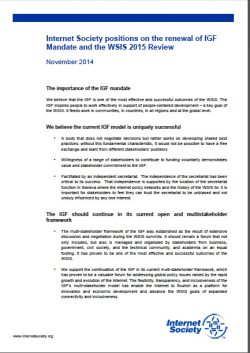The importance of the IGF mandate
We believe that the IGF is one of the most effective and successful outcomes of the WSIS. The IGF inspires people to work effectively in support of people-centered development – a key goal of the WSIS. It feeds work in communities, in countries, in all regions and at the global level.
We believe the current IGF model is uniquely successful
- A body that does not negotiate decisions but rather works on developing shared best practices: without this fundamental characteristic, it would not be possible to have a free exchange and learn from different stakeholders’ positions
- Willingness of a range of stakeholders to contribute to funding voluntarily demonstrates value and stakeholder commitment to the IGF.
- Facilitated by an independent secretariat. The independence of the secretariat has been critical to its success. That independence is supported by the location of the secretariat function in Geneva where the Internet policy networks and the history of the WSIS lie: it is important for stakeholders to feel they can trust the secretariat to be unbiased and not unduly influenced by any one interest.
The IGF should continue in its current open and multistakeholder framework
- The multi-stakeholder framework of the IGF was established as the result of extensive discussion and negotiation during the WSIS summits. It should remain a forum that not only includes, but also is managed and organized by stakeholders from business, government, civil society, and the technical community, and academia on an equal footing. It has proven to be one of the most effective and successful outcomes of the WSIS.
- We support the continuation of the IGF in its current multi-stakeholder framework, which has proven to be a valuable forum for addressing global policy issues raised by the rapid growth and evolution of the Internet. The flexibility, transparency, and inclusiveness of the IGF’s multi-stakeholder model has enable the Internet to flourish as a platform for innovation and economic development and advance the WSIS goals of expanded connectivity and inclusiveness.
The ICT for Development Resolution recognizes the importance of the IGF
- The Information and Communications Technologies for Development Resolution (ICT4D), currently being considered by the Second Committee, recognizes the importance of the IGF and its mandate as a forum for multistakeholder dialogue
- The ICT4D should include a renewal of the IGF mandate beyond the present 5-year cycle to facilitate strengthening of IGF procedures and its Secretariat, enable participants to secure long-term funding for projects, and instill confidence in potential donors to the IGF Trust Fund. This will provide institutional stability.
The IGF is having a positive impact on the advancement of WSIS goals globally
- In its nine-year existence, the IGF has proven to be an indispensable element of the Internet ecosystem. The IGF provides a unique opportunity for governments, business, civil society and the technical community to share experiences and best practices that can inform decision-making in their home communities.
- IGF participants have embraced the approach of “think globally, act locally” to address issues of development and human, economic and social growth which are essential to advancing the WSIS Action Lines and achieving the Millennium Development Goals.
- The IGF has led to greater understanding and consensus on challenging Internet governance and policy issues. Without the IGF, there is no space to discuss solutions, among all relevant stakeholders, for the full range of current and emerging Internet issues: from accessibility and infrastructure development to surveillance and the enjoyment of Human Rights online.
- The IGF has succeeded in expanding the participation of government representatives and other stakeholders, including from developing countries, Internet governance dialogues. This is best exemplified by the rapid growth of national and regional IGFs, and the enthusiasm of local communities (and ISOC chapters) involved.
